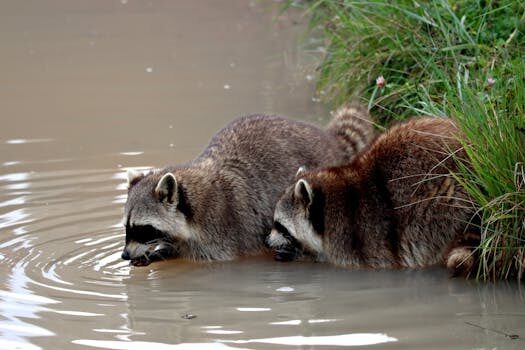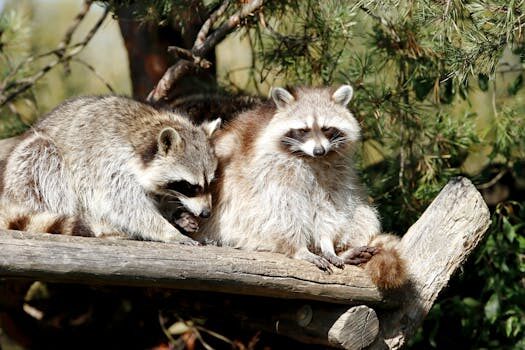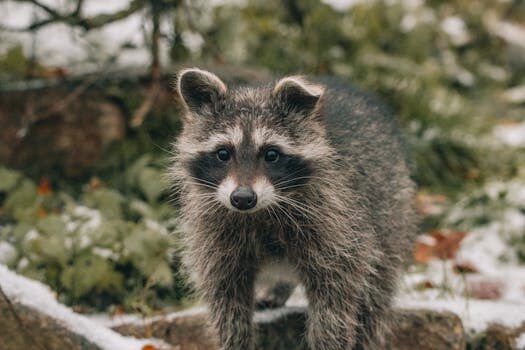Raccoons may look cute and harmless, but when they invade your yard, they can become a real nuisance. These intelligent creatures are known for their resourcefulness, but their quest for food and shelter can lead to damaged property and disturbed peace. If you’re struggling with unwanted raccoon guests, keep reading to learn about effective ways to encourage their departure.
Understanding the behavior and habits of racoons is key to keeping them at bay. When they target your yard, they’re likely seeking food, water, or shelter. Therefore, a multifaceted approach is necessary to ensure your outdoor space is less appealing to these nocturnal bandits. Let’s explore five strategies to try when you want to know how to get rid of raccoons in your yard.
How do you get rid of raccoons in your yard?
Removing raccoons from your yard can be challenging, but consistency is key. Start by securing your trash cans with tight-fitting lids or straps. Raccoons have nimble fingers, so consider adding locks or bungee cords for extra security. Additionally, keep your yard free of food leftovers, fallen fruits, and birdseed, as these can attract raccoons looking for an easy meal.
It’s also beneficial to remove potential shelter sites such as brush piles or hollow logs. If you have a chimney or attic, ensure they are sealed to prevent raccoons from nesting. Scare devices, like motion-activated lights or sprinklers, can also be effective in making your yard less inviting to these critters.
For persistent raccoon issues, consider using repellents that emit smells or sounds that raccoons dislike. Be aware that some repellents may need to be reapplied after rain or over time to maintain their effectiveness. If all else fails, trapping and relocating raccoons can be an option, but check local regulations before attempting this, as it may be illegal or require a permit in some areas.
What attracts raccoons to your property?
Raccoons are attracted to areas that provide easy access to food, water, and shelter. Open trash cans, compost bins, pet food left outside, and fruit trees can all act as magnets for raccoons. They are also drawn to water sources like ponds, fountains, or even pet water bowls.

Eliminating these attractions is crucial. Start by securing food sources and making water sources less accessible. Consider using fencing to protect gardens and fruit trees. If you compost, use a sealed bin and avoid adding meat or sweet foods, which are particularly tempting to racoons.
Keep your outdoor grilling area clean, and if you feed pets outdoors, remove the food bowls immediately after meal times. Remember, raccoons are not just looking for food; they may also seek out cozy nesting sites. Regularly inspect your property for any openings or crevices that could serve as a potential home for a raccoon family.
How to prevent raccoons from entering your yard?
Prevention is often the best strategy for keeping raccoons out of your yard. Begin by conducting a thorough inspection of your property to identify and seal any entry points. This includes repairing broken vents, covering chimneys with caps, and ensuring deck spaces are not accessible.
Next, focus on your landscaping. Raccoons are skilled climbers and can use overhanging branches to access rooftops or other structures. Trim any tree limbs that hang close to your home, and consider installing metal bands around trees to prevent climbing.
 How to get rid of foxes: simple ways to keep them out of your yard
How to get rid of foxes: simple ways to keep them out of your yardEmbrace the power of natural deterrents, such as planting herbs that raccoons find unappealing like mint or capsicum plants. Many homeowners find success with DIY repellents made from hot pepper or garlic, which can be sprayed around the perimeter of the yard.
- Secure trash cans with locking lids or weights
- Install motion-activated lights or sprinklers
- Use natural deterrents and repellents around the garden
- Keep pet food indoors and grilling areas clean
- Seal entry points and cover chimneys
Signs you have a raccoon problem
Recognizing the signs of a raccoon infestation is the first step towards resolving it. Be on the lookout for overturned trash cans and scattered debris, which are telltale signs of raccoon activity. Furthermore, listen for unusual noises at night, such as chattering, whining, or thumping, which could indicate raccoons are present.

Other indications include paw prints in the soil or mud around your property. Raccoon droppings are another clear sign; they are often found near food sources or den entrances. If you have a garden, you might notice crops that are eaten or damaged, as raccoons are not shy about feasting on your vegetables.
If you suspect a raccoon problem, inspect your home’s exterior for any access points, and check your attic or crawl spaces for nesting materials or damage. Addressing these signs early can prevent further damage and deter raccoons from settling in.
When to call a pest control professional?
If despite your best efforts, raccoons continue to frequent your yard, or if you find evidence of a large infestation, it may be time to call a pest control professional. Pest control experts can assess the situation, trap and remove the animals safely, and provide guidance on preventing future problems.
Professionals can also help with cleaning up after an infestation, as raccoon droppings can carry parasites and diseases. They will also be knowledgeable about local laws and humane practices related to raccoon removal. Remember, handling wildlife can be dangerous, so it’s best to rely on experts when necessary.
Additionally, a professional can help you implement long-term exclusion techniques, ensuring that once the raccoons are gone, they won’t come back. This might include recommendations for structural modifications or changes to your property’s landscape.
How to scare raccoons away naturally?
There are several natural methods to deter raccoons without resorting to harsh chemicals or traps. One effective approach is to use smell as a deterrent. Raccoons dislike the scent of ammonia, vinegar, and predator urine, such as that from coyotes or dogs. Soak rags in these substances and place them around your property’s perimeter.

Noise can also be a deterrent. Playing a radio in your yard at night or using ultrasonic repellents can make raccoons uncomfortable enough to leave. Be mindful of your neighbors when using sound as a deterrent.
 How to get rid of chipmunks in the garden: 5 humane methods to deter these critters
How to get rid of chipmunks in the garden: 5 humane methods to deter these crittersAnother approach is to create an unwelcome environment by installing motion-activated lights or sprinklers. The sudden light or water can startle raccoons, encouraging them to avoid the area. Furthermore, keeping your yard clean and free of food scraps will reduce the attraction for raccoons to visit.
Best raccoon repellents: What works?
Finding the best raccoon repellent can be a process of trial and error, as raccoons are known to be quite adaptable. However, some repellents have proven to be more effective than others. Commercial repellents that contain naphthalene or predator urine can be successful. These should be applied around the areas where raccoons frequent, such as gardens or trash storage.
D-I-Y repellents made from hot peppers or essential oils like peppermint or eucalyptus can also deter raccoons. These natural options are safe for use around pets and children and can be reapplied as needed. Electronic repellents that use flashing lights or high-frequency sounds can also be effective, though they may disturb pets or neighbors.
Finally, remember that a combination of repellents and preventive measures usually offers the best results. Consistently applying repellents, securing your property, and removing attractants will make your yard much less appealing to raccoons.
Frequently Asked Questions About Raccoon Removal
How do you get rid of a raccoon asap?
To remove a raccoon quickly, you need to eliminate all food and water sources immediately. Secure your trash cans and remove any pet food from outdoors. Use repellents such as ammonia-soaked rags around the property, and install scare devices like motion-activated lights or sprinklers to create an unwelcoming environment. If the raccoon is inside your house, such as in the attic or chimney, it’s best to contact a wildlife removal professional as soon as possible.

What do raccoons hate the most?
Raccoons have a strong dislike for certain smells and sensations. They hate the smell of ammonia, vinegar, and predator urine. They are also averse to the touch of spikey or uncomfortable surfaces, so placing mesh wiring or prickly mats around the base of your home can deter them. Furthermore, the bright lights of motion-activated fixtures or the sudden startle of a sprinkler can be quite effective in making raccoons feel unwelcome.
What smell will keep raccoons away?
Certain smells are known to repel raccoons, including ammonia, vinegar, and the scent of predators like coyote urine. You can also use natural deterrents such as cayenne pepper, garlic, or peppermint oil to create a homemade repellent. Apply these around your garden, trash cans, and other areas you want to protect from raccoons.
What food is toxic to raccoons?
While raccoons are omnivores and can eat a wide variety of foods, certain things can be toxic to them. Foods like chocolate, caffeinated beverages, and foods containing the sweetener xylitol should never be given to raccoons. Additionally, grapes and macadamia nuts can be harmful to them.
For a visual demonstration of some of these raccoon deterrent techniques, check out this informative video:
 How to get rid of ants: repel these insects from your home and garden with these tips
How to get rid of ants: repel these insects from your home and garden with these tipsIn conclusion, while raccoons can be persistent, there are many humane ways to encourage them to move on from your property. By understanding what attracts raccoons and applying the strategies outlined above, you can protect your yard and keep these masked marauders at a safe distance. Remember, patience and consistency are key in solving your raccoon problem.


